

Landscape painting - The Impressionist landscape and its impact. With the freedoms afforded by newly invented tools, the Impressionists moved away from Romanticism and realistic renderings, favouring a more subjective form of expression.

Nature in art: Defined and processed. Nature in art. The belief that nature had a spiritual quality was not only present in American art, but Korean art as well.
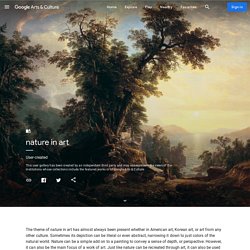
Nature was believed to not only be connected to human life, but to spirituality. Korean art not only depicts nature, but more specifically human experience in nature. Landscape painting became a reflection of the time, which was a dominance and growth of philosophical ideals, like Confucianism for example.
Landscape painting - The Impressionist landscape and its impact. With the freedoms afforded by newly invented tools, the Impressionists moved away from Romanticism and realistic renderings, favouring a more subjective form of expression.

Artists such as Claude Monet, Camille Pissarro, Pierre-Auguste Renoir, and Berthe Morisot worked outdoors—en plein air—and recorded in paint the effects of light and weather. Their sketchy application of paint, visible brushwork, and inventive use of colour was groundbreaking and influenced generations of artists, including Post-Impressionists Paul Cézanne (e.g., Mont Saint-Victoire series, 1880s–1906), Vincent van Gogh (e.g., A Wheatfield with Cypresses, 1889), and Paul Gauguin (e.g., Tahitian Landscape, 1893).
Neo-Impressionism, a parallel movement among the Post-Impressionists, was spearheaded by Georges Seurat. The 20th century saw a continued interest in nontraditional approaches to painting the landscape. Paul Nash: Modern Artist, Ancient Landscape – Exhibition at Tate Liverpool. Paul Nash (1889–1946) is one of the most important artists of the first half of the twentieth century and the most evocative landscape painter of his generation.
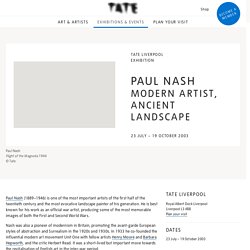
He is best known for his work as an official war artist, producing some of the most memorable images of both the First and Second World Wars. Nash was also a pioneer of modernism in Britain, promoting the avant-garde European styles of abstraction and Surrealism in the 1920s and 1930s. In 1933 he co-founded the influential modern art movement Unit One with fellow artists Henry Moore and Barbara Hepworth, and the critic Herbert Read. It was a short-lived but important move towards the revitalisation of English art in the inter-war period. On the Easel: Sunrise, Bribie Island - Draw Paint Academy.
SKIES. CITYSCAPES. SEASCAPES. Modern Landscapes. Expressionism and Nature. For Expressionist artists, nature represented a healing escape from the crowds and anxiety of the city.
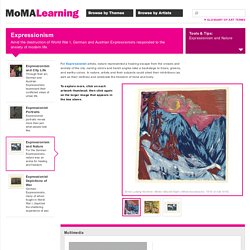
Jarring colors and harsh angles take a backstage to blues, greens, and earthy colors. In nature, artists and their subjects could shed their inhibitions (as well as their clothes) and celebrate the freedom of mind and body. Ernst Ludwig Kirchner. Winter Moonlit Night (Wintermondnacht). 1919 (In fall 1918) Max Pechstein. Franz Marc. To explore more, click on each artwork thumbnail, then click again on the larger image that appears in the box above. Encompasses varying stylistic approaches that emphasize intense personal expression. Sunsets — Themes in Art. Storms — Themes in Art. What Techniques Did the Impressionists Use for Shadows? Once you start painting and closely looking at colors, you soon realize that simply reaching for a tube of black paint whenever you need to put in a shadow doesn’t work.
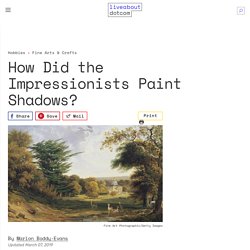
The result isn’t subtle enough to capture a realistic shadow. The Impressionist Renoir is quoted as saying “No shadow is black. It always has a color. Nature knows only colors … white and black are not colors.” Sketching Clouds in Pencil. What Type of Clouds Will You Draw?

Drawing clouds seems like an easy task and it is. Yet, when you're looking to do a great sketch in pencil, it's important that you pay attention to the subtle details. This exercise will walk you through the process step-by-step and give you the tips required to create eye-catching clouds on paper. Possibly the most difficult part of drawing clouds in pencil is the absence of color. How to Paint Different Types of Clouds.
Painting a stormy sky with its dark, dramatic clouds or the pinks and reds of a sunset is very appealing.

A little knowledge about the common cloud forms and their characteristics will help you to capture these scenes and enable you to add credible clouds to any painting. How Clouds Are Formed Although it's invisible to the naked eye, the air around us contains water vapor. 6 Ways to Improve Reflection Drawings. Reflections, whether in water, a window, or the surface of a shiny object, can be surprisingly easy to draw.
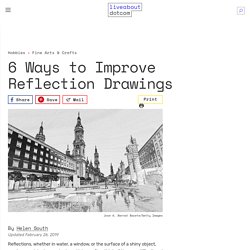
Yet, we often think of them as difficult and make the work harder than it should be. There are some common pitfalls to be aware of when drawing reflections. The good news is that all of these are avoidable if you simply trust your eyes. Creating the Illusion of Depth and Space. There are several different ways to create the illusion of depth and space in a painting, whether the painting is representational or abstract.
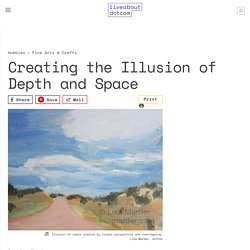
If you are a representational painter, it is important to be able to translate what you see in three dimensions onto a two-dimensional surface and to convincingly evoke the sense of depth and space. If you are an abstract painter, learning how to create different spatial effects can make your paintings stronger and more interesting. Here are some ways to achieve that. Tips for Drawing Winter Scenes. There are several components to a successful winter scene: your materials, your subject, and your method.
Winter weather, snow, and icy surfaces have unique properties that will reward your thoughtful drawing choices. Materials You Need Start with good drawing paper. Texture and color are very important when drawing winter scenes. Landscape Art and Drawing Ideas. Landscape doesn't just mean hills and trees. Landscape can include any outdoor scene from wilderness and farmland through to suburban views and urban cityscapes. It can encompass a broad vista and distant mountaintops, through to macro studies of small details. Sometimes landscape drawing is a way to pay homage to your environment - many landscape artists have a passion for the outdoors and nature.
But it can also be a way to make art about the human condition because we all exist within our landscapes, urban, suburban, and rural. Images of the external world are often allegories for internal states. A Classic Landscape. Reference Photos for Painting Landscapes. There’s something about a spectacular landscape, whether it's a barren semi-desert scene or rolling green pastures, that makes artists' fingers itch to capture its essence on canvas.
Neist Point Lighthouse Neist Point Lighthouse is the most westerly point on the Isle of Skye in Scotland. It sits above rocky cliffs, but on the land side, it's all lush green grass in spring and summer where sheep graze. Note the large foghorn! Blue Boat Reflections. German Expressionism Themes: Nature. Best Contemporary Landscape Painters. Creating the Illusion of Depth and Space. How to Create Depth in a Landscape Painting. Create Distance in a Landscape With Tone. Hockney – Van Gogh: The Joy of Nature. Van Gogh Museum, Amsterdam 1 March – 26 May 2019. The Illusion of Detail. The Fitzwilliam Museum : Snow country home.